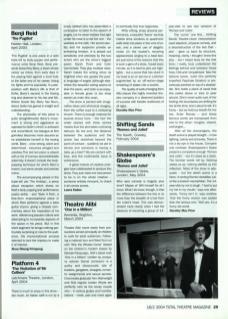Who said comedy is tragedy plus time? Maybe ol' Will himself for all I know. What I do know, though, is that the difference between the two is no more than the breadth of a hair from fair Juliet's head. This was demonstrated most clearly when I had the pleasure of escorting a group of 14 year-olds to see two versions of Romeo and Juliet.
The 'comic’ one first... Shifting Sands’ theatre-clown interpretation used slapstick, physical comedy, and a deconstruction of the text that – yes! – gave us back its structure, meaning, clarity. I thought I knew this play – but I heard lines for the first time; I really, truly understood the feelings behind and between those lines; I felt and I empathised. Take the balcony scene. Juliet (the perfectly imperfect Paschale Straiton) is precariously perched on top of a stepladder. She holds a plank of wood that she peeks above or tries to peer around. She's never quite sure of her footing, the boundaries are shifting for her all the time; she's about to fall. It's funny – but we hold our breath for her too. Enter Romeo – and those famous words are transposed from one to the other: mingled, shared, exchanged...
After all the shenanigans, the death scene is played straight – in low lighting, calmly and sincerely. There is not a dry eye in the house. Compare and contrast: Shakespeare's Globe present a competent-enough Romeo and Juliet – but it's dead as a dodo. The familiar words roll by. Nothing wakes us up, nothing startles us into reflection. Most of the show is adequate – but the death scene is a farce. A ranting Romeo straddles Juliet like a lovelorn necrophiliac. The 14 year-olds try not to laugh. ‘I had to put my hat in my mouth,' says one afterwards. ‘Funny isn't it,' says another, ‘that the funny version was sadder than the serious one.’ Well yes, it's a funny old world.

